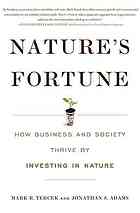
Nature's Fortune
How Business and Society Thrive by Investing in Nature
کتاب های مرتبط
- اطلاعات
- نقد و بررسی
- دیدگاه کاربران
نقد و بررسی

January 28, 2013
Environmentalists think businesspeople are irresponsible. Businesspeople think environmentalists are impractical and naive. Can’t we all just get along? We certainly can, says Nature Conservancy CEO Tercek, formerly a managing director at Goldman Sachs. The organization, which pursues conservation in all 50 states and 35 countries, has given Tercek the impetus to ask: how can environmentalists and businesses work together to produce conservation measures that make sense? First, they need to work with governments to enact strong and effective policies, and with individuals, who need to make their voices heard as voters and consumers. Tercek, along with science writer and conservation biologist Adams, covers a broad spectrum of environmental needs and challenges (water usage and consumption, preventing overfishing, reef restoration, climate change, urban conservation, population growth), as well as companies that have an ideal mix of environmental footprint and global brand. The authors convincingly argue that corporate responsibility is not only the right ethical tactic, but the right business move; making an investment in the environment now will help companies obtain the necessary resources in the future, and it will also have a positive effect on their bottom lines. According to this savvy book, both environmentalists and business executives need to understand “how nature contributes to economic and ecological well-being.” Agent: Lisa Adams, the Garamond Agency.

March 1, 2013
Nature Conservancy president Tercek and science writer Adams explore the possibilities of the environmental movement joining with the business community to tap nature's capital, to the betterment of both. Can activities that produce good environmental outcomes also produce good commercial results? Can the businessperson's fundamental concerns square with the time-honored environmentalist's belief in the natural world's inherent value? The authors claim that there is plenty of common ground, and they provide a number of examples to make the point: Where would Coca-Cola be without a clean and plentiful supply of fresh water? This constitutes an opportunity to save habitats that "act as giant sponges," from the high grasslands of Ecuador to the flood plains of the Mississippi River. The fishing industry can avoid the tragedy of the commons through easements, markets for trapped fish, communal fisheries and catch shares. McDonald's has changed its purchasing policies to avoid alignment with the plunderers of the rain forest. Protecting coral reefs and planting drought-tolerant trees increases productivity while avoiding environmental degradation. Green urbanism is looking at the city system as a whole, providing green space and creating a framework for ecologically sensitive development. The authors call for long-term vision, particularly when it comes to our youth, who need encouragement and incentives to get outside and burnish their innate biophilia and sense of place. Occasionally, the authors' optimism that business will see the long-term light may not convince skeptics appalled by the rush to frack and more deep-sea drilling, but there is no denying the opportunities available in the big picture. A hopeful message that a sensible marriage of business and environmental interests is in the cards, which until now has mostly been trumped by shortsightedness.
COPYRIGHT(2013) Kirkus Reviews, ALL RIGHTS RESERVED.

March 15, 2013
Tercek is president and CEO of the Nature Conservancy and formerly served as a managing director at Goldman Sachs, where he worked to find market-based solutions to environmental challenges. Adams is a science writer and conservation biologist. Common belief holds that business and environmental groups are at odds, with loggers, ranchers, fishermen, and corporations that exploit natural resources on one side and the so-called tree huggers on the other. In the past few decades, however, we have reached a tipping point; with seven billion people on the planet, the earth's resources are long past being considered inexhaustible, and big business is coming to realize that stewardship of the environment is in their best interests. From renewal of the Mississippi floodplain to the banning of fishing trawlers along our shores to the restoration of prairie and wetlands in urban areas, unlikely allies are coming together to create models of sustainability that serve the interests of both business and environmentalist groups. The authors examine this new kind of conservation and show how it is of utmost economic importance to our farms, fisheries, corporate stakeholders, and communities.(Reprinted with permission of Booklist, copyright 2013, American Library Association.)

























دیدگاه کاربران